We tried the Ninja Cold Press Juicer - it's perfect for entry-level juicing
The Ninja Cold Press Juicer is an entry-level budget-friendly slow juicer
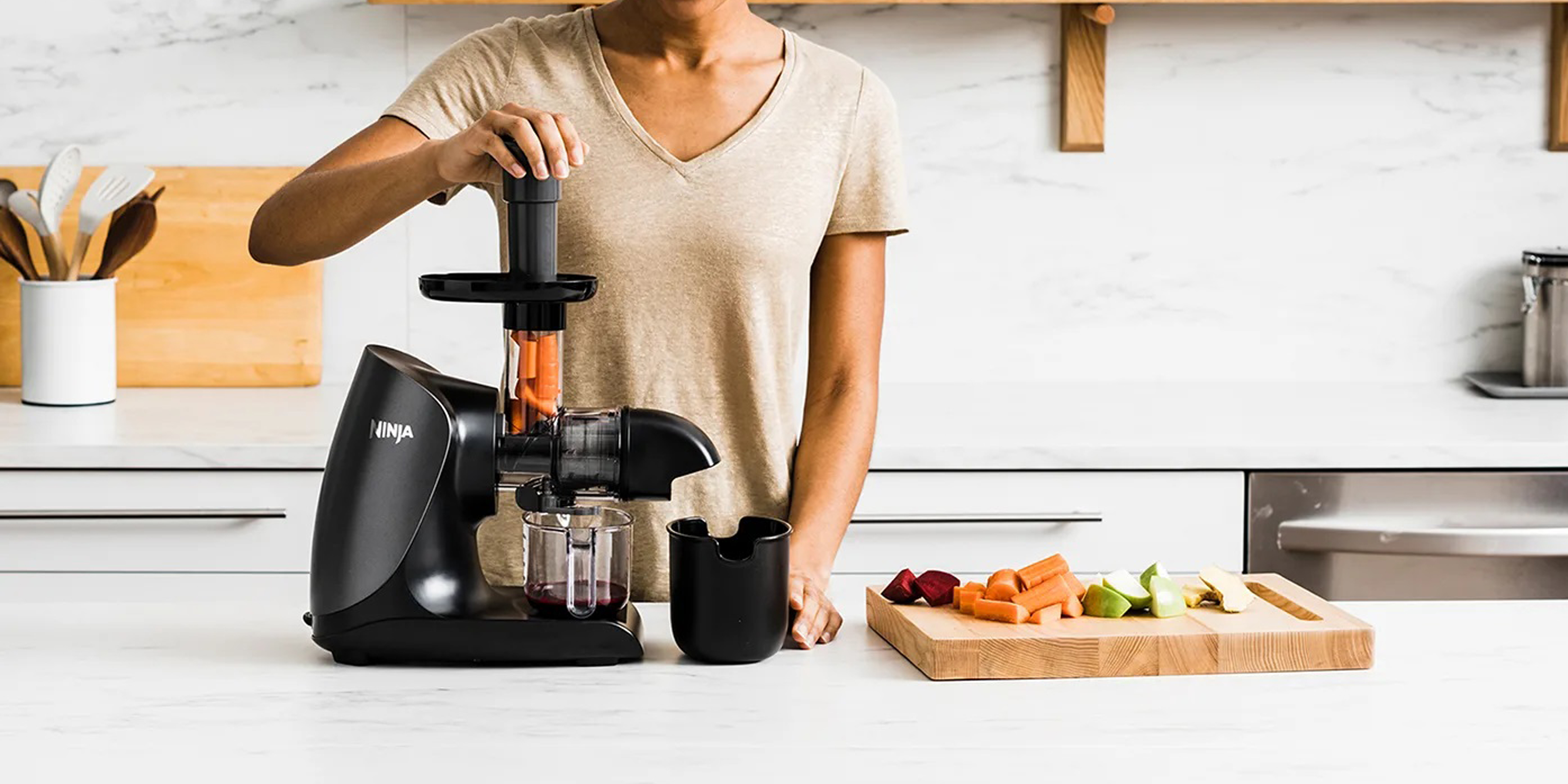
The Ninja Cold Press Juicer is a good choice if you’re looking for a slow juicer that’s not too pricey. It can be fiddly to assemble, and it doesn’t extract as much juice as we’d like. But for occasional juicing it’s fine, plus you can always use the high pulp filter to let more pulp flow into your drink and reduce what goes into the bin.
-
+
Makes very smooth apple juice
-
+
Quiet
-
+
Three pulp options
-
+
Dishwasher safe parts
-
+
Juice is froth free
-
-
Fiddly to assemble
-
-
Small juice jug
Why you can trust Ideal Home

If you’re looking to increase the amount of healthy nutrients in your diet, investing in one of the best juicers is a simple way to do this without hitting the supplement tablets. By juicing them in a mixed drink, you can even include fruits and vegetables you usually dislike, so it’s a great way to increase the range of different plants you consume.
With an RRP of £170, the Ninja Cold Press Juicer is an affordable option, especially if you nab a bargain using Ninja Kitchen discount codes. Cold press juicers also go by the name masticating or slow juicers and are said to be the best type of juicer to use if you want to get the maximum nutrition in your juice. They are also usually the best option if you want to minimise waste and extract every last drop of juice, but they’re often very pricey in comparison to centrifugal juicers.
I’ve reviewed a lot of Ninja appliances over the years and I’m usually impressed by how well they perform. So I had high hopes for this Ninja juicer. I tried it in my home for a week and compared it to three other juicers I was reviewing in the same month, which gave me a really good insight into how it stands up against the competition. I must admit though, it didn’t wow me.
The Ninja Cold Press Juicer product specs
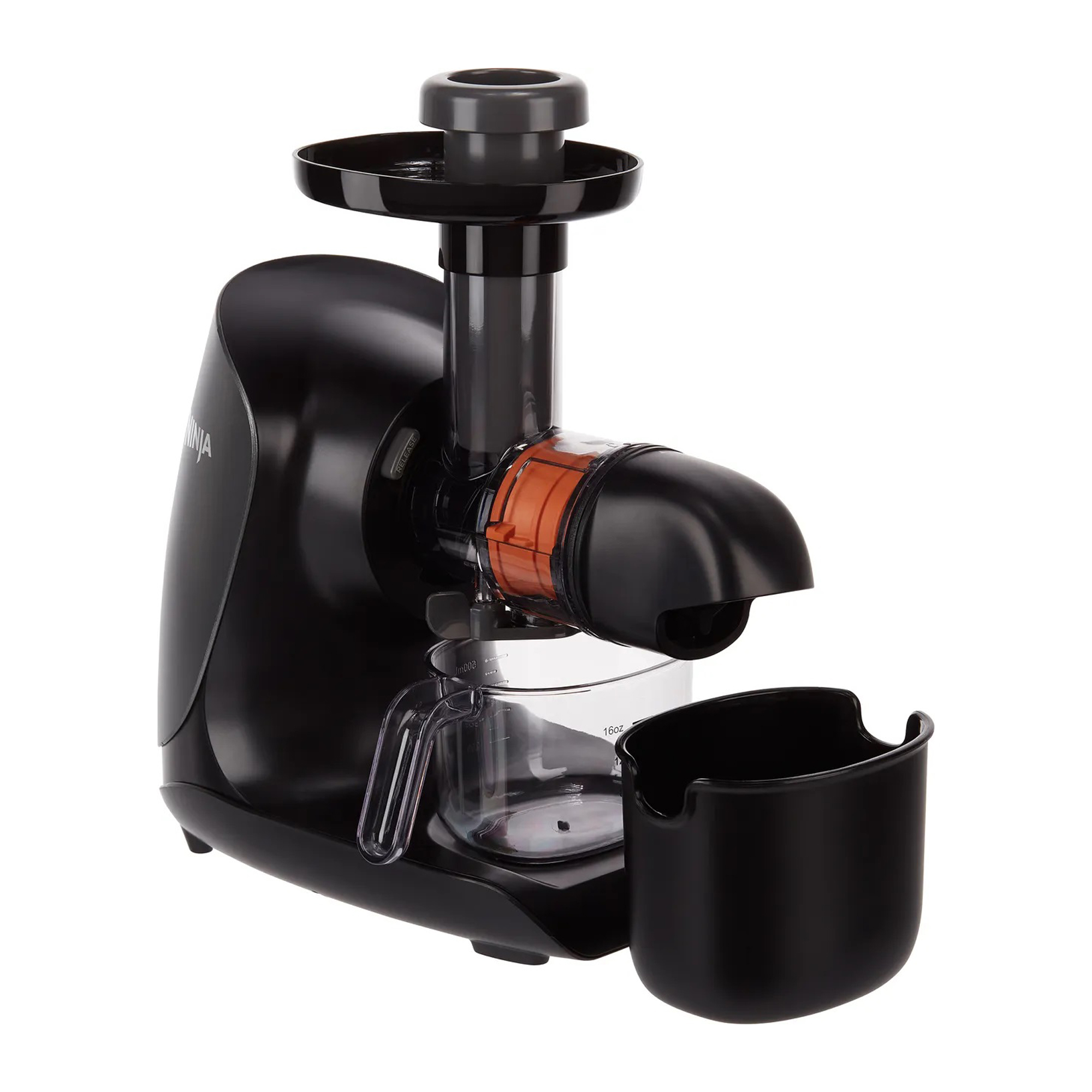
- Centrifugal or Masticating: Masticating
- Material: Plastic
- Capacity: 0.5 litre juice container, 0.71 litre pulp container
- Feeding tube: 40mm
- Power: 150 Watts
- Weight: 3.76kg
- Dishwasher safe: yes
- Other features: Low pulp, medium pulp and high pulp filters included.
Who tested this juicer

After completing a Home Economics degree, Helen went on to work for the Good Housekeeping Institute and has been reviewing home appliances ever since. She lives in a small village in Buckinghamshire in the UK and was allowed to keep this Ninja juicer after the review.
Unboxing
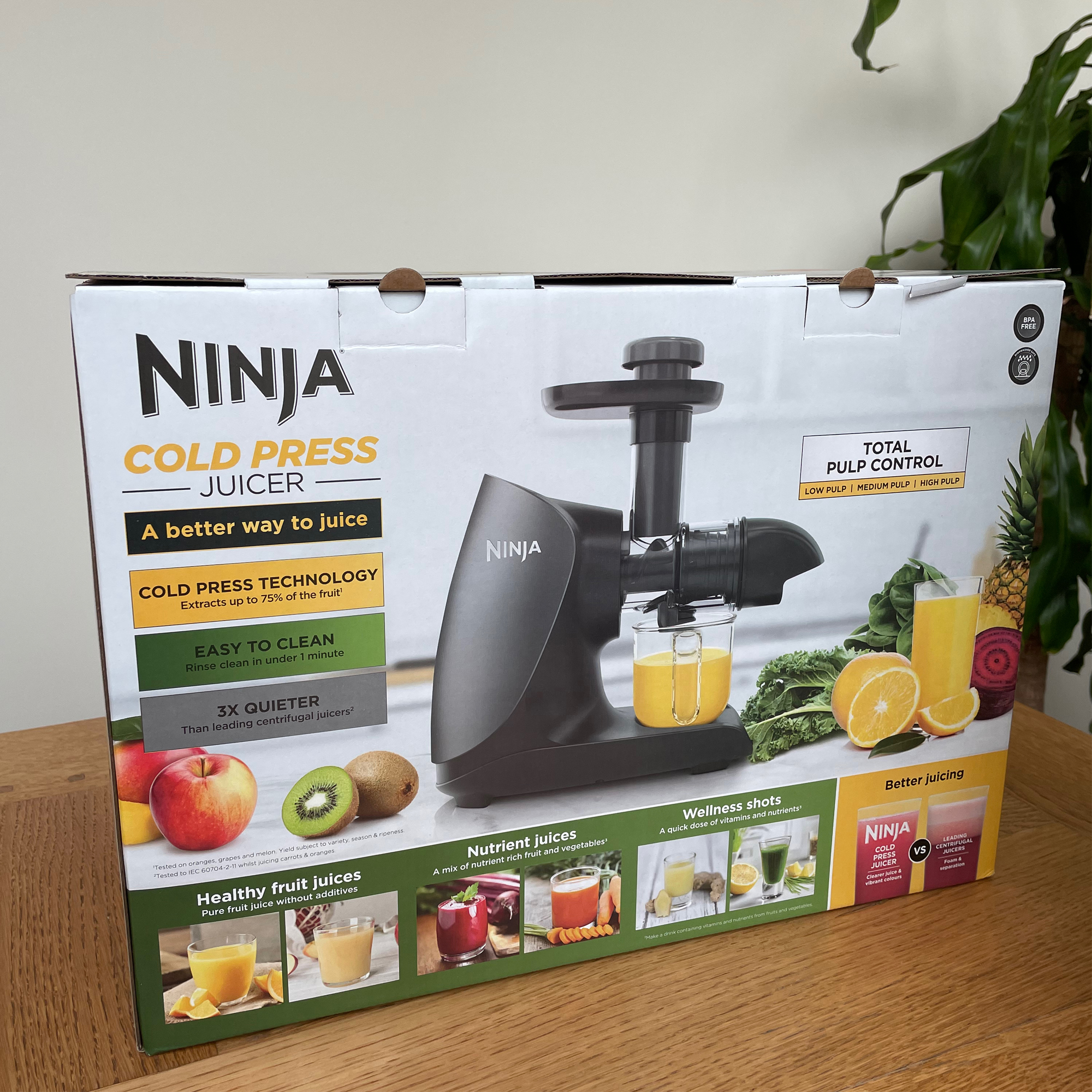
The Ninja Cold Press juicer arrives in a compact box and as with all Ninja products, the packaging is mostly cardboard so I’m not fretting about excess hard-to-recycle packaging. The first thing I noticed as I got it out of the box was that the main part of the juicer is quite chunky and a bit plasticky. I've seen nicer looking juicers.
The juicing parts were already semi assembled when I removed them from the box, but I had a play around with it and took them apart. Assembling all the parts again was fiddly and not as intuitive as I’d like. You do get used to it, but if you’re new to juicers, you’ll probably need to refer to the manual the first few times.
The juice jug is small and due to the position of the spout there’s not space beneath it to juice directly into your own glass or jug. The pulp container isn’t huge either, but you could easily swap this for a bigger bowl if needs be.
There are three filters included in the box: low, medium, and high pulp options. This is a nice touch because in my experience you usually don’t get much opportunity to control the amount of pulp when juicing at home.
Sign up to our newsletter for style inspiration, real homes, project and garden advice and shopping know-how
First impressions
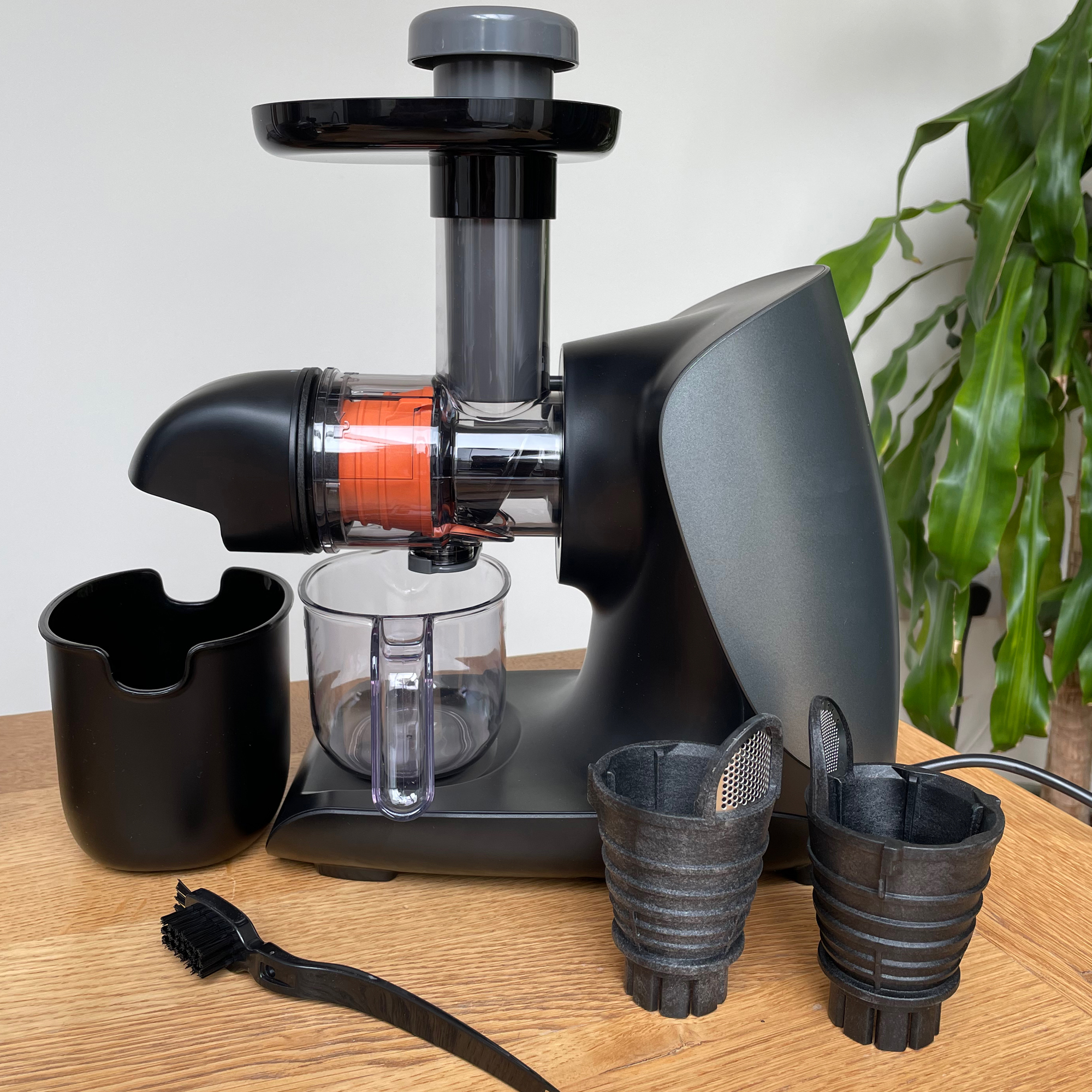
There’s a small recipe booklet included, and I love that it also lists recipes for the pulp too. Juicing can be very wasteful and it’s great to get some inspiration on ways to use the pulp in cooking, instead of simply throwing it into the bin.
The controls consist of just two buttons, a stop/ start button and a reverse button, so at least there’s nothing complicated to get to grips with there. And there’s a handy food tray at the top of the feed chute. This means when you’re juicing you can load it up and tip the pieces of fruit or vegetable in from there. It just makes life a little easier, especially when the chute is small like this one or if you’re juicing things like berries.
A handy quick start guide in the box gives information on how best to prepare various foods before juicing. It also lists which of the pulp filters can be used with different fruits and vegetables, which is helpful.
Making apple juice
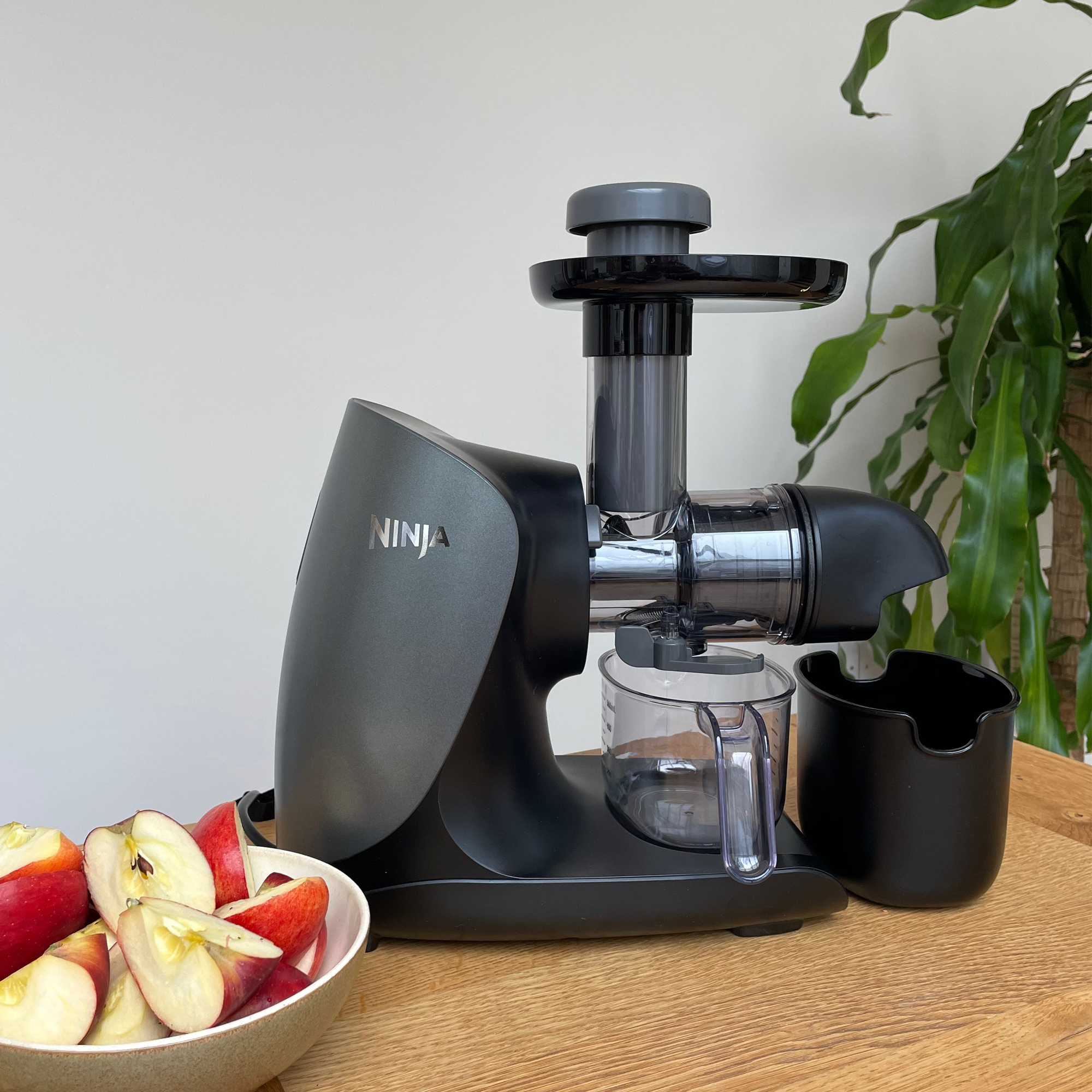
I started off by juicing apples, and the quick start guide advised cutting them into 5cm pieces, which for my apples meant roughly into quarters, though even some of the quarters were too big and had to be cut down.
It took 2 minutes to juice just four apples, which is fairly slow and though the juicer motor is very quiet, the juicing process was loud and squeaky as it ground and chewed through the apples. It hit 83dB on my noise meter, though that kind of noise level is similar to other juicers when tackling apples.
The juice had a good 1cm of froth on top, which was disappointing. But underneath the froth, it was an incredibly clear and smooth texture, with a fresh sweet apple flavour.
I noticed that the waste pulp was still quite wet, and having weighed the apples before juicing as well as the amount of juice produced, I worked out that it turned 63% of the apples into juice, which means 37% waste. The best juicers I’ve reviewed recently will juice apples and give yields of up to 75%, so this is disappointing in comparison.
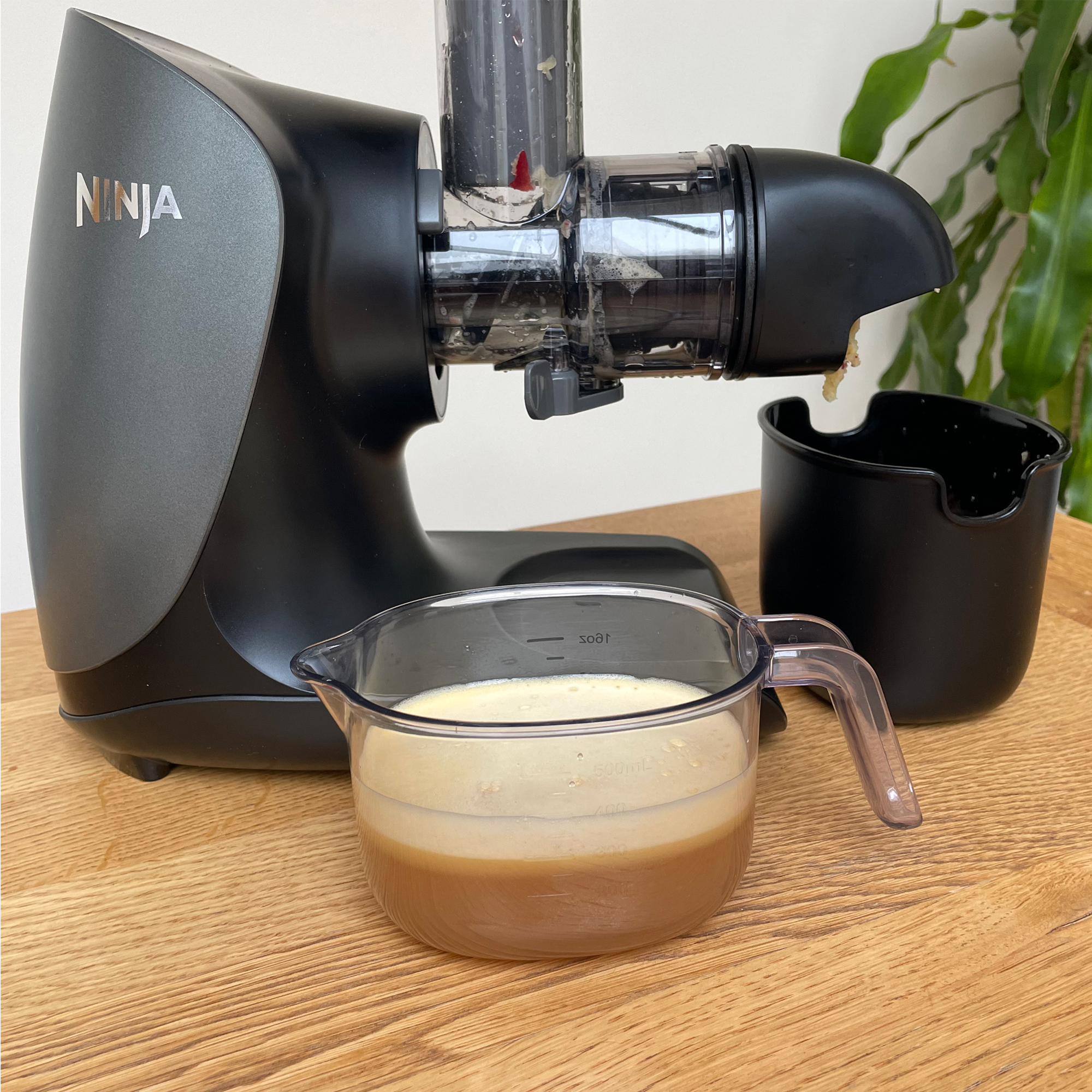
Making orange juice
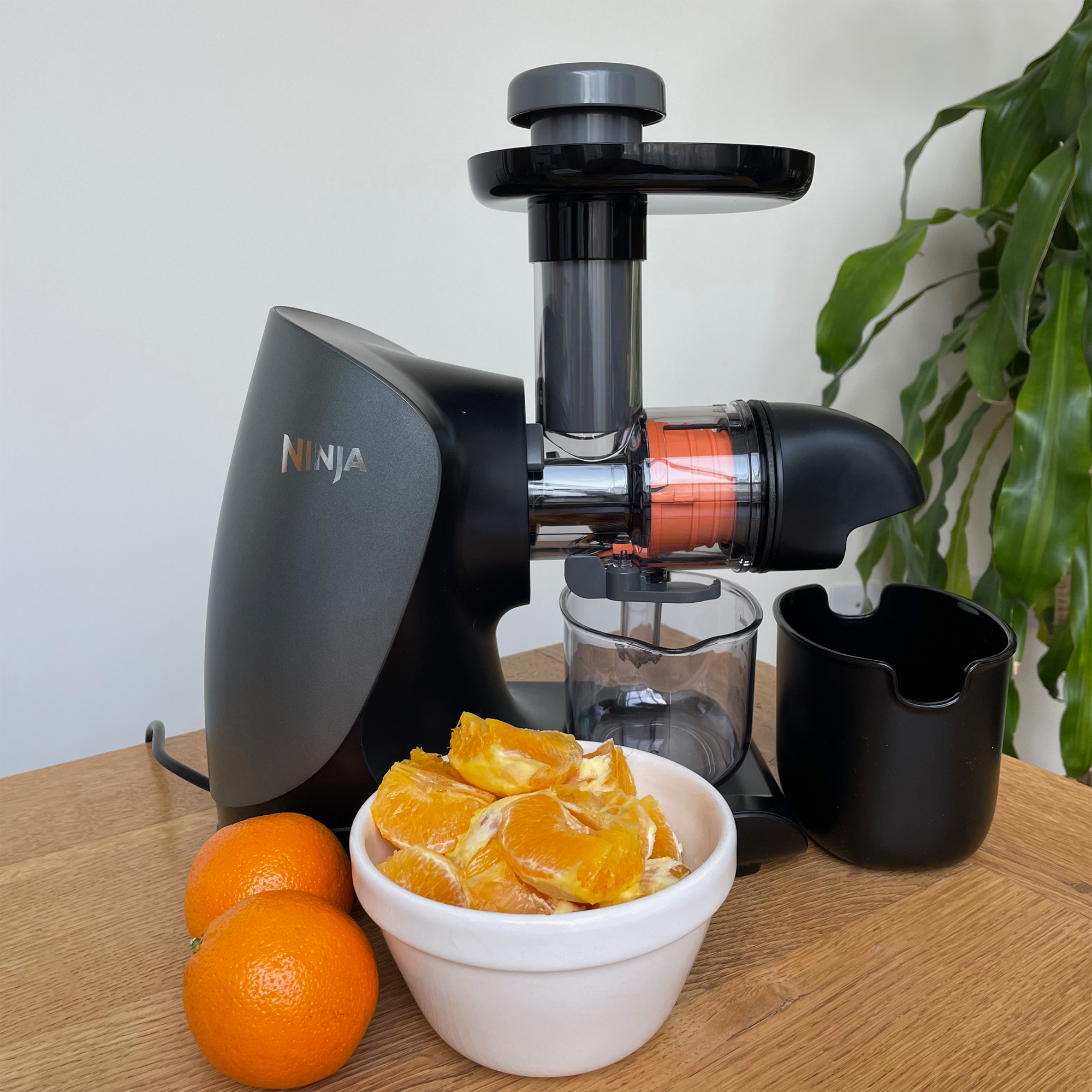
Since it comes with a choice of three filters, I chose the high pulp filter for a pulpier orange juice and also in the hope that less of the fruit would end up in the bin.
I peeled four oranges and divided them into quarters so they’d fit in the feed chute. It took just under a minute and a half to get them all juiced and it was one of the quietest juicers I’ve used – hitting just 65dB on my noise meter.
The juice was very vibrant with absolutely no froth on top, it looked very appealing. The large pulp filter had let through just the right amount of pulp and it tasted delicious. The yield was 67% which is pretty average and I must admit I expected it to be a tad higher, especially given that the juice contains pulp. But it’s a delicious drink nevertheless.
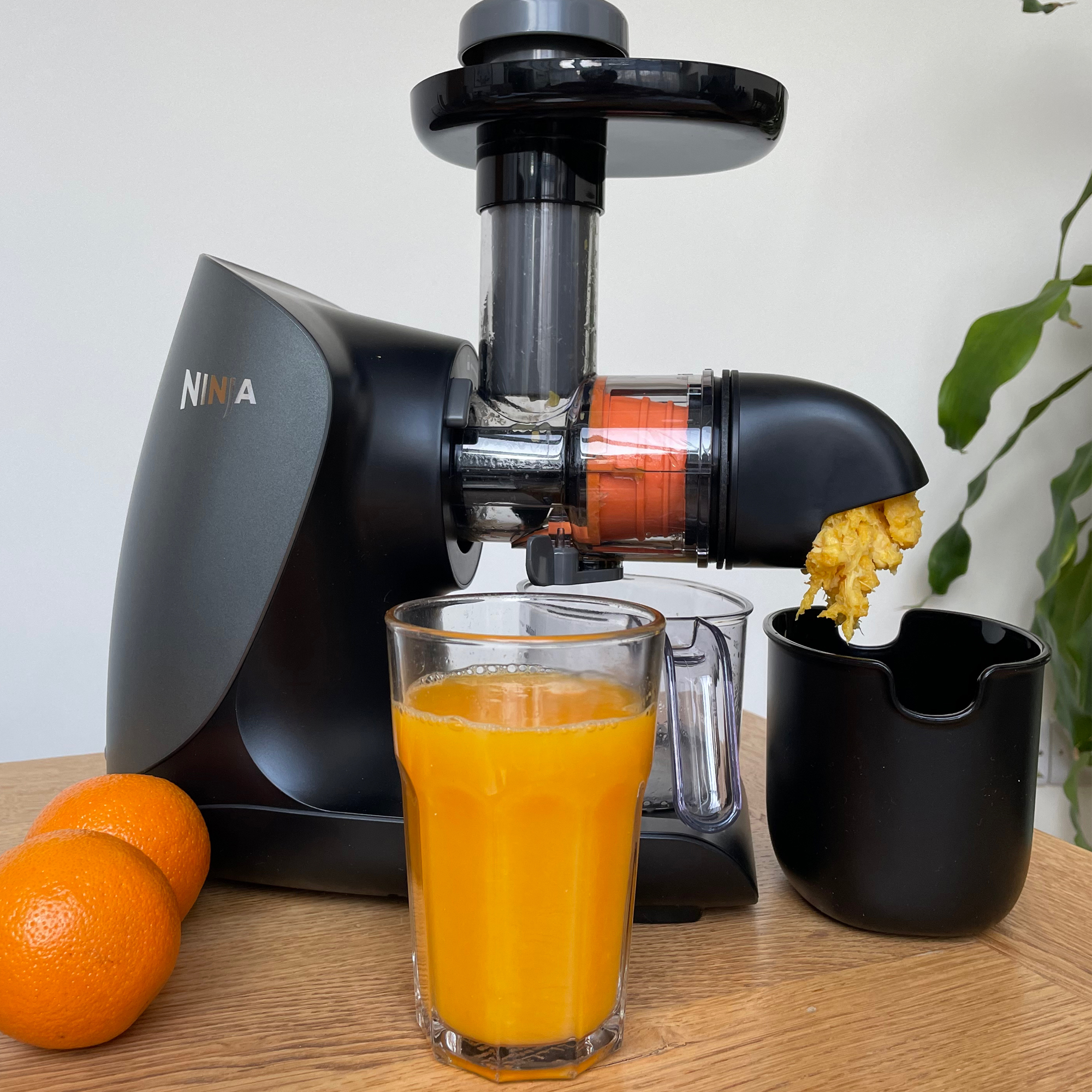
Making a vegetable juice
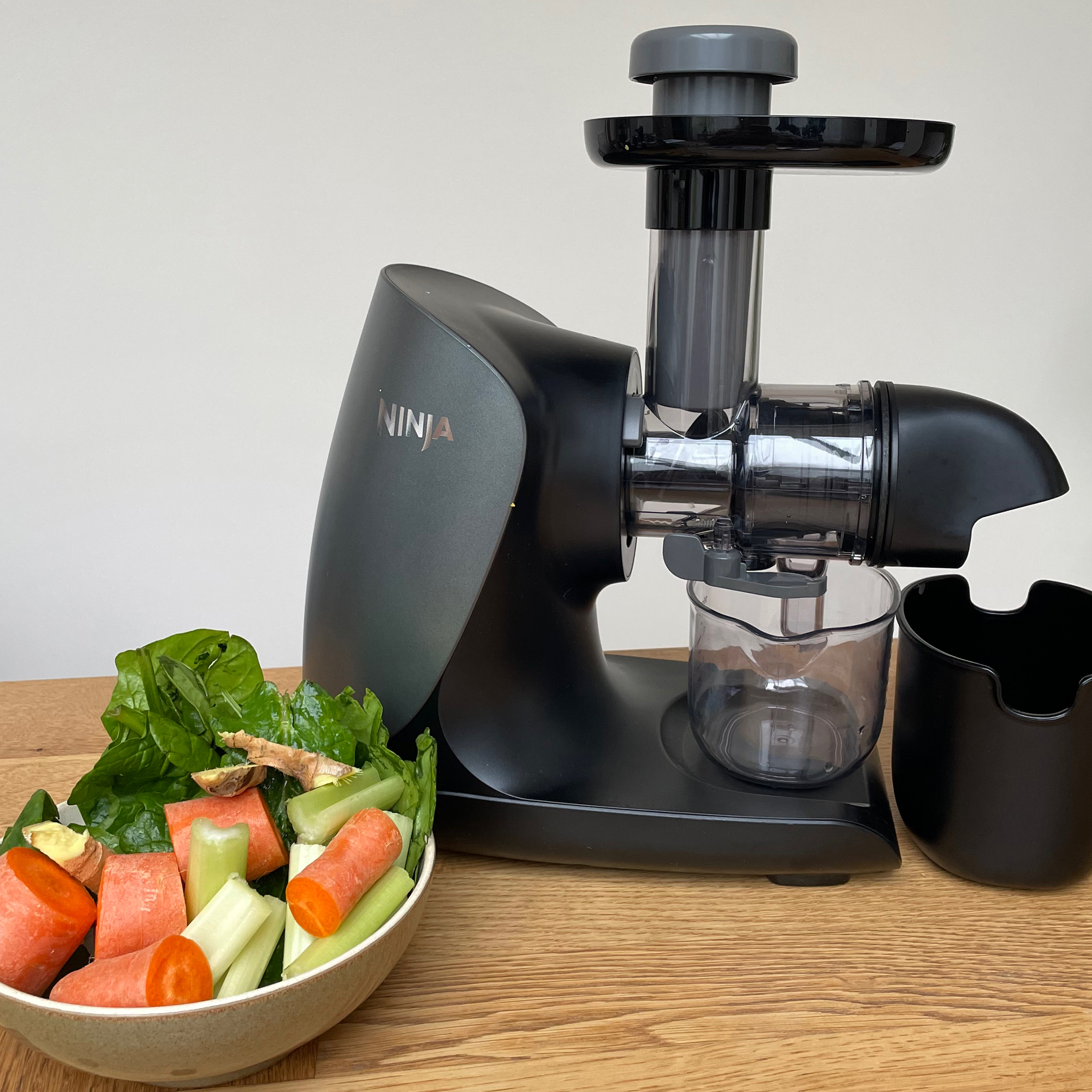
When making a mixed, healthy vegetable juice, I topped and tailed a carrot and along with a couple of sticks of celery, chopped it all into pieces that were no larger than 5cm. I also sliced some ginger but left the skin on and added in a large handful of spinach into the mix.
It took two minutes to juice everything, but frustratingly I could still see spinach going round and round the corkscrew auger, despite the fact juice had stopped coming out. I also found the small chute annoying when trying to push all the spinach in.
Nevertheless, the vibrant green juice was tasty with a very strong ginger hit. Even though I used the fine filter, the texture wasn’t as smooth as the apple juice I made, and the juice had a slightly powdery texture from some small bits that had made their way in.
The yield for this juice was just 45% which is lower than I’ve got from most other juicers, confirming yet again that this isn’t a high yielding juicer.
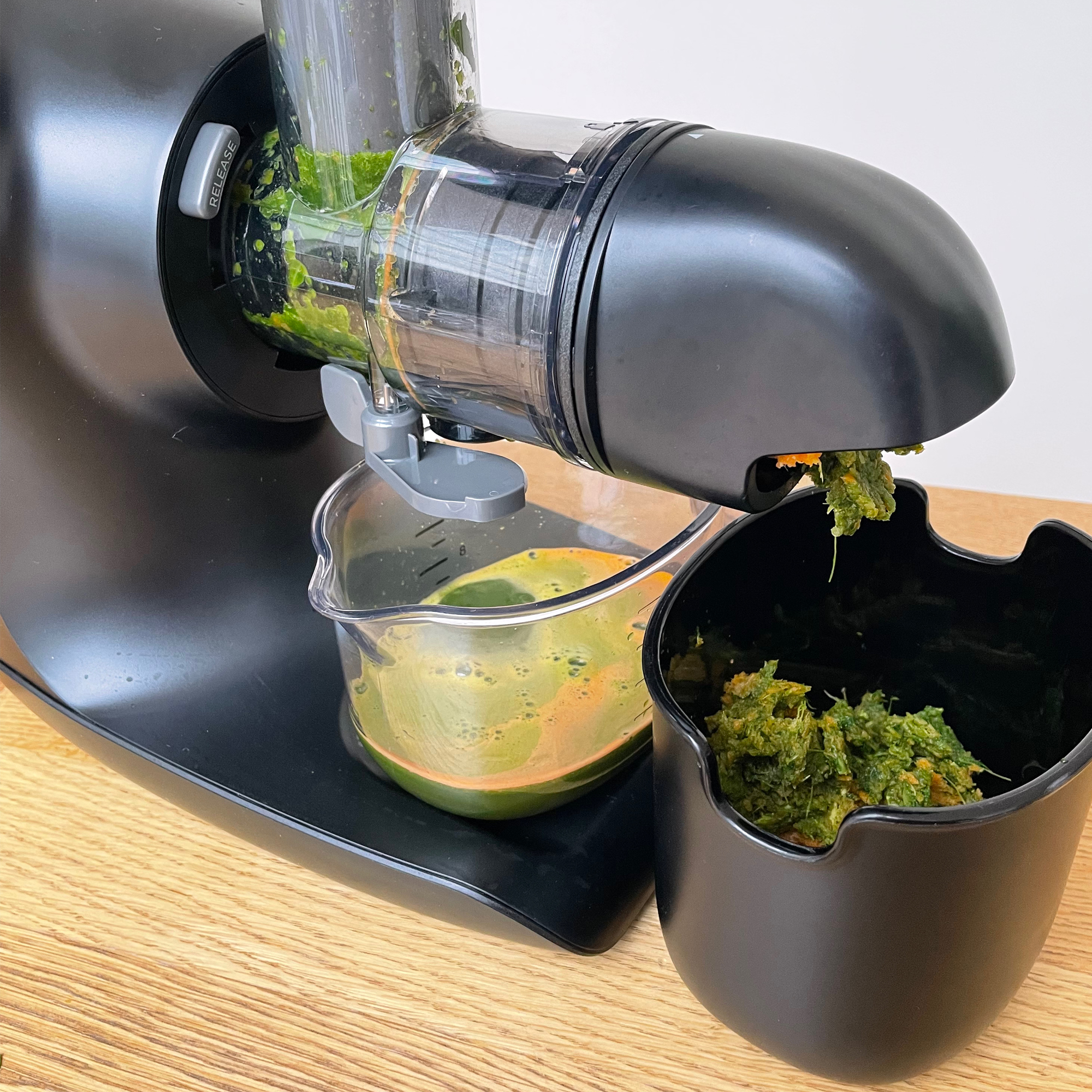
Juicing raspberries
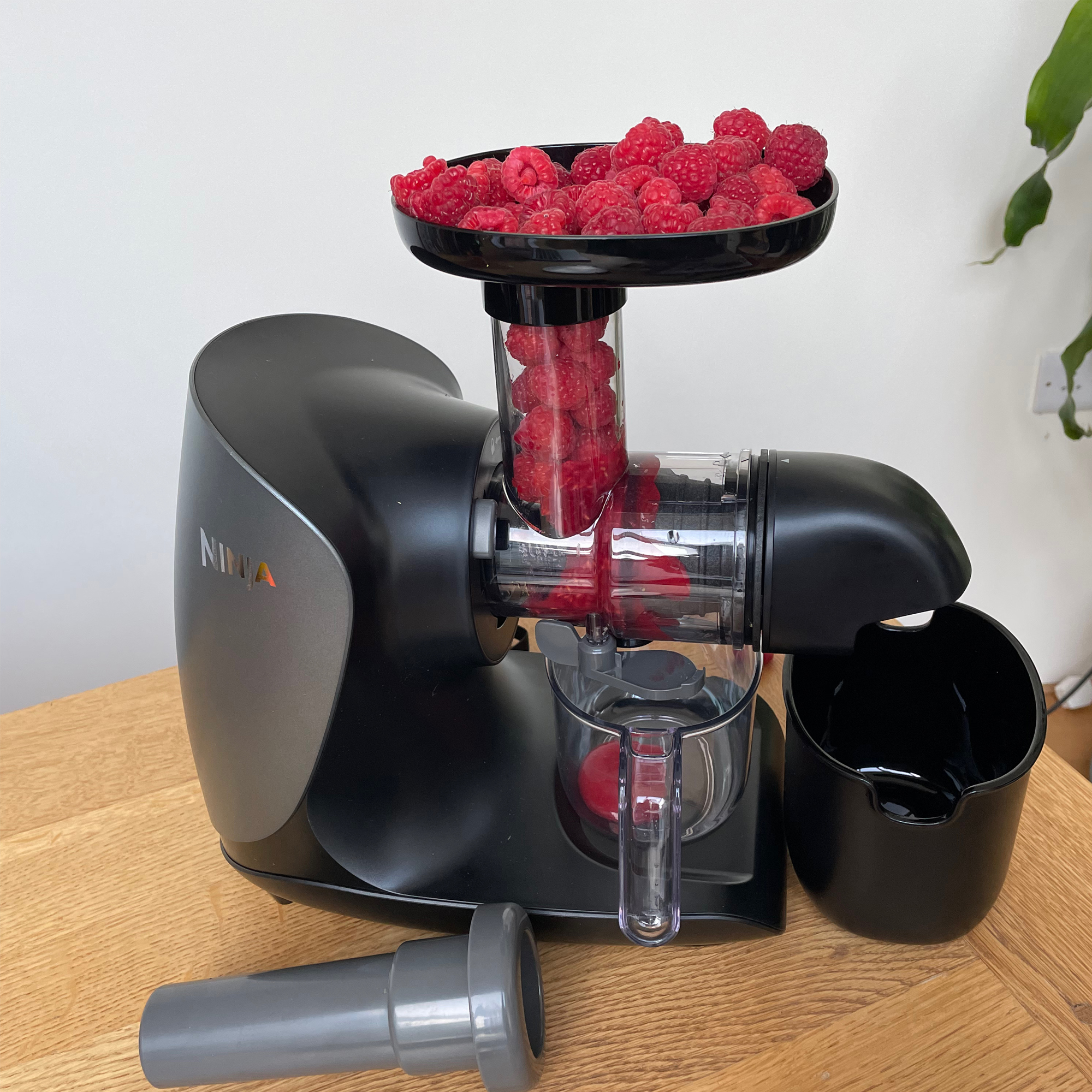
The instructions say berries can only be juiced using either the medium or the high pulp filter, but I suspected the seeds might get through if I used the high pulp filter, so I opted for the medium one instead.
It was slow going and I eventually stopped it after six minutes because despite the fact that I could still see plenty of raspberry going around in the mechanism, no more juice was coming out. In the end it turned 45% of my raspberries into a smooth thick puree, which means quite a lot of my 300g pack ended up as waste. And when you consider that raspberries are quite expensive, it’s not one I’ll be repeating in this juicer.
Barely anything came out into the pulp container, most of the waste was trapped inside the juicer, making for a messy clean up. If it weren’t for the fact that the holes in the high pulp filter are far bigger than raspberry seeds, I’d be tempted to try that one next time, but I just don’t think it’ll hold back the seeds, which would make it a pointless exercise.
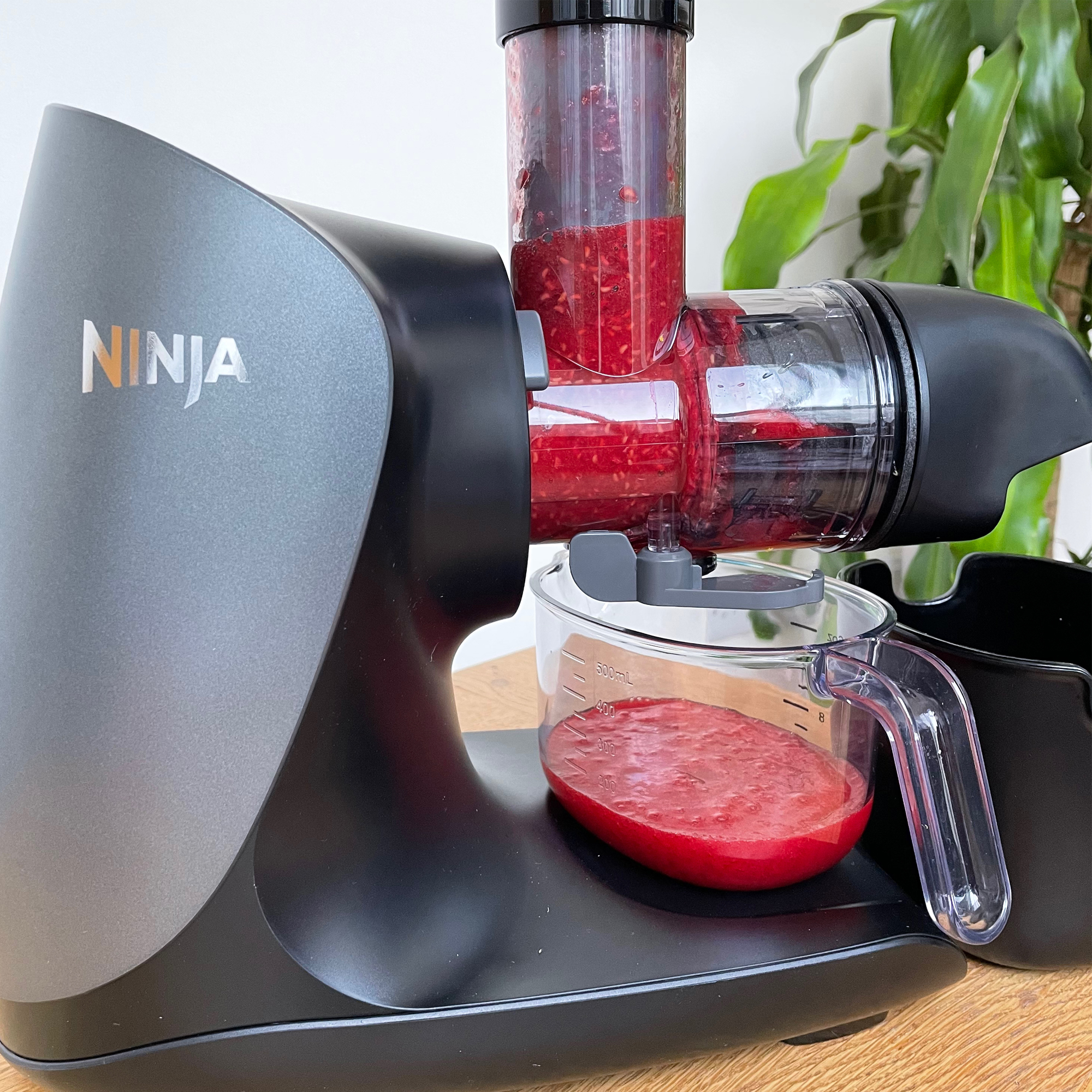
Cleaning
Virtually every time I disassembled it after use, it was well clogged with fruit and vegetable fibres inside, so I had to spend a bit of time removing all the debris before I could clean it. Hand washing or a rinse with hot water is often all it needs though.
I found the supplied cleaning brush useful for getting into all the crevices and areas where pulp might become lodged. But I’d be lying if I said it wasn’t a bit fiddly to clean. Plus, the right angle on the feed chute makes it awkward to dry thoroughly.
Thankfully all the parts are dishwasher safe and everything came out of my dishwasher nice and clean. Plus, as the parts are all quite small, it doesn’t take over most of the dishwasher like some of the bigger juicers.
Comparisons
If affordability is top of your priority list you’re not set on a slow juicer, a good centrifugal juicer might be a better bet. The Nutribullet Juicer costs less than £100 and is currently top of our list of best juicers. It’s easy to use, very fast, and best of all the wide feed chute means there’s no need to chop of your fruits and vegetables before juicing.
If you’re willing to pay a bit more to get maximum juice yields, one of my personal favourites is the Magimix Juice Expert 3. Not only does it manage to extract more juice than most other juicers, but it comes with a citrus press for delicious orange juice as well as a clever device that means it can puree fruits like banana for smoothies. But at around £250 it’s more of an investment, so for occasional juicing, it might be too pricey.
Should you buy the Ninja Cold Press Juicer?
The biggest advantage of the Ninja Cold Press Juicer is that it’s an affordable cold press juicer with the option to choose between three different filters for different levels of pulp. But the downside is that for a cold press juicer, the yields are lower than I would expect and the pulp that’s ejected is still quite wet, so there’s a lot of waste.
Having said that, I enjoyed the orange juice and it made a lovely smooth apple juice. So for occasional juicing it’ll do just fine, but if you’re a juice aficionado looking for the best cold press juicer, I don’t think it’ll live up to your expectations.
About this review, and the reviewer
Helen reviewed this juicer alongside three others for Ideal Home, so she could make informed comparisons on speed of juicing as well as juice yields and ease of use. She’s consumed more than her fair share of juice for this review, but don’t worry, she made sure she supplemented the juice diet with plenty of pasta and cheese to keep things in balance!

After completing a Home Economics degree, Helen went on to work for the Good Housekeeping Institute and has been reviewing home appliances ever since. She lives in a small village in Buckinghamshire in the UK, where she reviews all sorts of home and garden appliances for Ideal Home using her wealth of experience.